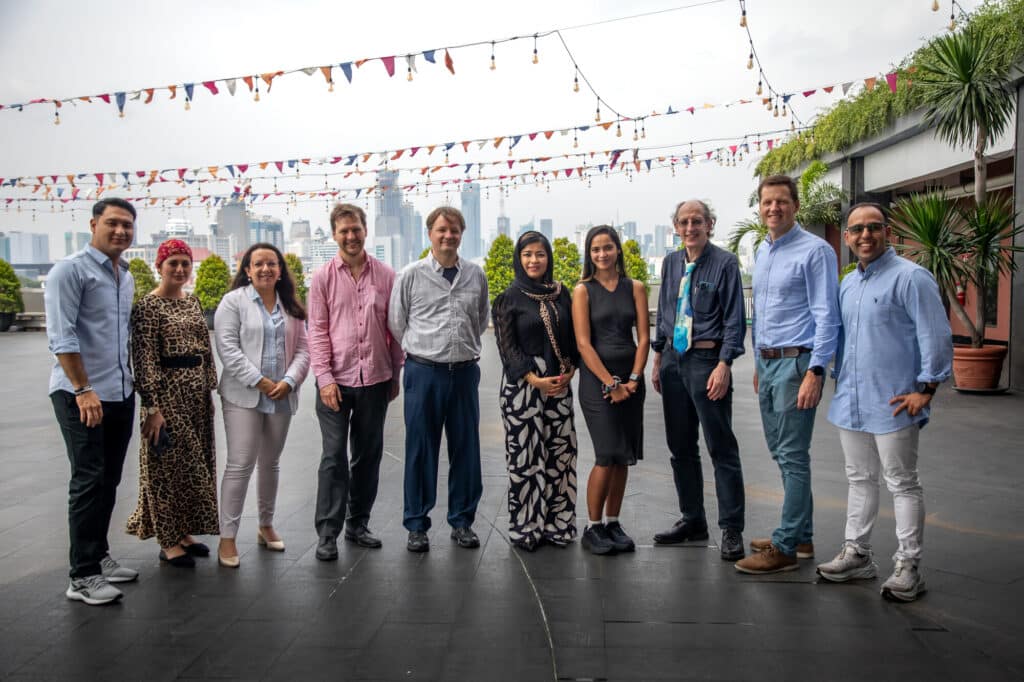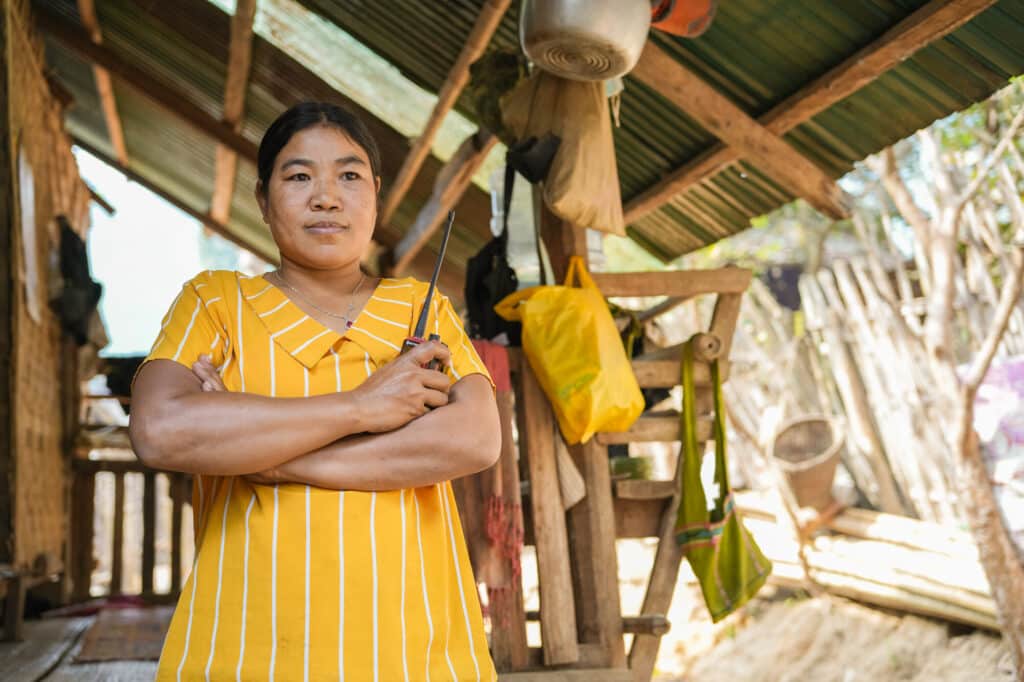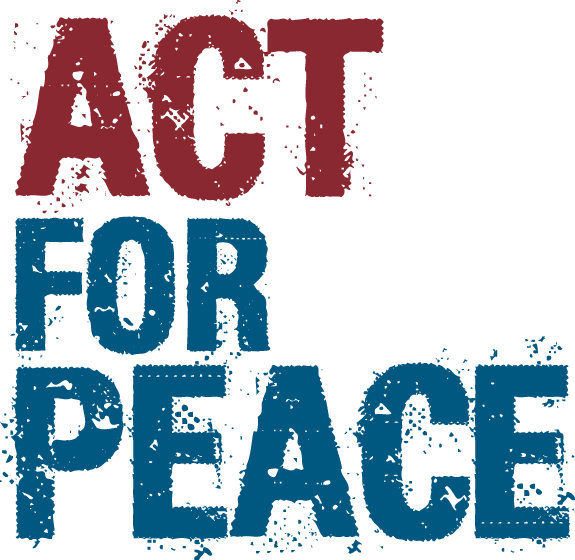Brian Barbour, Act for Peace Senior Refugee Protection Advisor, is currently campaigning to enshrine refugees’ right to participate in international law and policy reform.
This work is being led hand-in-hand with refugee-led organisations. The Asia Pacific Network of Refugees (APNOR), one of the co-leading partners in the current global working group on meaningful refugee participation, brings deep lived experience and grassroots leadership to the effort.
Refugee led Policies
“Refugees don’t just need a seat at the table—we need to build our own table.
“We are no longer asking to be included—we are already leading.”
~ Najeeba Wazefadost, a former refugee and Executive Director of APNOR
It might seem like a simple, commonsense approach that shouldn’t require a legal framework. If work impacts a particular group of people, they should be consulted.
Right?
Unfortunately, that’s not the reality.
“Shockingly, refugees are not included in decisions that affect their lives,” says Brian.
“Often, very high-level government officials are making decisions behind closed doors, without transparency or public visibility. But government officials quite often have no idea what life is like as a refugee. So, they’re creating very theoretical or politically driven policies that don’t match reality. And this is one of the reasons why a lot of policies, particularly about refugees, aren’t always successful, because they don’t address actual needs or the actual circumstances on the ground.”
At the inaugural Global Refugee Forum (GRF) in 2019, governments, international institutions, private sector stakeholders, non-government organisations and refugees came together as part of a global action planning process. From this first GRF, Act for Peace, together with the Asia Pacific Network of Refugees (APNOR), the Asia Pacific Refugee Rights Network (APRRN), and the Global Refugee–Led Network (GRN) worked together to create pledges on the meaningful participation of refugees in decision-making.
Since then, over 50 stakeholders have committed to the pledge, including the Australian government as well as Canada, the US, the Netherlands, Germany and Denmark. The Joint Refugee Statement and the Multi-Stakeholder Meaningful Refugee Participation Pledge is available on UNHCR’s website.
The pledge has very tangible outcomes. Australia now has a Refugee Advisory Committee made up of refugees who are advising the government on policies and programs. But in order for this pledge to have concrete outcomes, the progress needs to be cemented within a legal framework.

refugee rights to meaningful participation
In response, a global working group was established by Act for Peace, the Asia Pacific Network of Refugees (APNOR) and the Kaldor Centre for International Refugee Law at the University of New South Wales, bringing together the 20 experts—12 refugee leaders and 8 academic/legal experts. This team has developed a consultation draft of a declaration on refugees’ rights to meaningful participation.
The working group has finalised a ‘consultation draft’, which will go out for global consultation. The group then hopes to work alongside UNHCR to develop an Executive Committee Conclusion on Meaningful Participation.
This would be the start of law reform at the global level while simultaneously, efforts will be made at the regional, national, and local levels in many contexts around the globe, making sure that refugees have a right to participate in all the decisions and programs that affect them.
According to Brian, there is universal agreement on refugees’ rights to participate in theory, but the declaration is an important step to ensuring those rights are respected in practice.
“What we want to do is move from rhetoric to rights. Everyone agrees that meaningful participation is important. But those are just words. it doesn’t ensure that anything is going to happen in practice,” he says.
“What we want to do is operationalise that. We want it to be implemented in practice. We need to define what it means to ensure meaningful participation.”
From rehetoric to rights
“This is not just consultation for consultation’s sake.
“It is refugees shaping the process, designing the questions, and guiding the conversations. That’s what meaningful participation looks like.”
~ Najeeba Wazefadost, a former refugee and Executive Director of APNOR
The consultation part of the process is important because it models meaningful participation, ensuring that refugees globally jointly own the process.
“We want to bring this draft declaration to the world,” says Brian. “We want to give everyone a voice. We want everyone to have a say in what this declaration says and how it says it. We’re trying to model meaningful participation in the process itself.”
According to Brian, this bottom-up approach is vital in ensuring programs deliver the outcomes refugees need.
“It means we work with refugees, and they lead on what they need,” he explains. “Everything is better when it’s that way, because how could we possibly know what life is like in a refugee camp? Refugees know the day-to-day realities and the risks they face, and they have the strategies for coping with those challenges. Our role is to remove the barriers and to help facilitate those strategies.”

refugee led participation at every level
If the declaration is adopted, Brian hopes this will mean that refugees will have a seat at the table in decision-making contexts, will be involved in service delivery, and will be part of all coordination bodies.
“At every level, refugees themselves should be involved – in how the programs are set up, how the programs run, and the policies that are implemented. Not only is this the right thing to do, but the programs will be more effective.”
At a time when humanitarian organisations are facing funding crises and uncertain futures, according to Brian, this kind of work is paramount.
“It could have a profound impact,” he says.
Brian explains that if refugees had representation at every level – locally, regionally, and globally – the impact would be huge.
“If everyone started to incorporate meaningful refugee participation into their way of working, all the programs would be more effective. It would be a fundamental change to the way that protection is provided globally and that humanitarian work is done.”
Act for Peace is committed to backing displaced people. This work is a collective effort. Refugee-led organisations like APNOR, together with Act for Peace and other global partners, are committed to ensuring that meaningful participation becomes a right, not just rhetoric—and that refugees are recognised as leaders in shaping the systems that affect them.
A new Global Standard is coming
Refugees have the right to be included in decisions that shape their futures. This DRAFT Declaration outlines:
- The legal foundations of refugee participation
- The obligations of states and institutions
- Best practices for inclusive, transparent, and accountable engagement
Led by refugee leaders, co-developed with experts, this DRAFT document is a powerful step toward justice.
📄 Read the Declaration
How you can help
External Consultation
We are excited to announce the launch of the external consultation phase for the Declaration. The Declaration was produced for the purposes of public consultation, NOT as a done deal. This critical step invites broader engagement from refugee communities, civil society, governments, and other stakeholders to review the draft and share feedback.
Let your voice be heard.
Online consultations
We will host several online consultation sessions in the coming months to deepen discussions and provide platforms for direct engagement. Please stay tuned for announcements about dates and registration.
The timeline/deadline for feedback
Please submit your feedback by August 20, 2025 to ensure your input shapes the final Declaration.
Share your Feedback
We encourage you to read the draft Declaration and send your thoughts, suggestions, or questions to mrpworkinggroup@gmail.com. Your voice matters.
